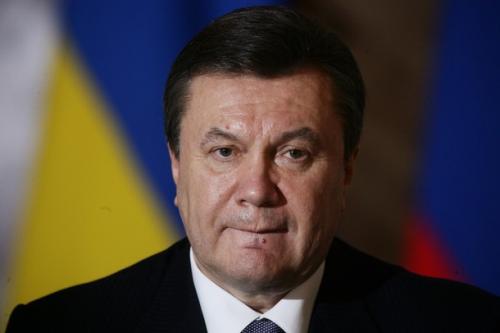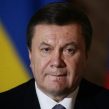
Will 2012 Bring Popular Revolt to Ukraine?
Publication: Eurasia Daily Monitor Volume: 9 Issue: 9
By:

Surveys and polls show there is widespread popular anger, frustration and contempt for the Viktor Yanukovych administration that has managed to anger many different groups in every Ukrainian region. Imprisoned opposition leader Yulia Tymoshenko (16.3 percent) is more popular than Yanukovych (13.3 percent) whose popularity is waning even in his home region of Donetsk. Declining standards of living, anger at the November 2010 Tax Code, democratic regression, and growing corruption have contributed to the rapid decline in popularity. In addition, the mistreatment of Tymoshenko is “harming the authorities’ ratings” (https://www.ng.ru/cis/2011-12-29/6_timoshenko.html).
Added to these problems are perceived attacks on Ukraine’s national identity that fuels a nationalist aspect to protests. These include Yanukovych annulling the annual Day of Freedom holiday to commemorate the Orange Revolution, the April 2010 “Kharkiv Accords” extending Russia’s Sevastopol naval base for 30 years, Education Minister Dmytro Tabachnyk’s policies, attempts to make Russian a state language, and pending transfer of gas pipelines to a Russian-dominated consortium.
The Times predicted that 2012 “will be the year of Slavic revolt against authoritarian regimes in Russia, Belarus and Ukraine,” adding “Ukraine will repeat its 2004 Orange Revolution after anger at austerity measures boils over when President Yanukovych’s Party of Regions is accused of stealing parliamentary elections. The opposition leader Yuliya Tymoshenko will be freed from prison after Mr. Yanukovych is forced to resign, but will fail to win the presidential election” (https://www.thetimes.co.uk/tto/news/world/article3272500.ece#.Tv7rvrn8YLQ.mailto).
The former Deputy Secretary of the National Security and Defence Council, Stepan Havrysh, pointed out “we stand between surrender of key assets and the technical default of the state” (https://www.radiosvoboda.org/content/article/24424542.html). External borrowing will be difficult and very expensive this year due to poor relations with the EU and the International Monetary Fund (IMF). Moody’s predicts Ukraine’s rating in 2012 will experience a significant downgrade. The paranoia of the authorities at the possibility of mass protests is growing in response to the above factors (see EDM, November 18, 2011). Yanukovych billboards are guarded by the police to stop a growing number of cases of paint thrown at them.
The authorities have responded in five ways that re-introduce Soviet KGB tactics and Soviet political culture by linking dissidents to Western conspiracies and violent nationalists:
1. By making it more difficult to protest using heavy handed police tactics. State governors and the Tax Administration have sent forms to NGOs to collect extensive data about organizations, leaders and members. These two structures will “intensify the monitoring of planned protests filed with local authorities.” There is no doubt among NGO leaders that this data will end up with the Ukrainian Security Service (SBU). The main objective is to collect intelligence on which NGOs will monitor the elections and the foreign assistance they will receive (The Ukrainian Week, December 23, 2011).
2. Through draft laws prepared by the Party of Regions, which emulate Russian legislation that bans external support to political parties and NGOs. In 2003-2004, the Party of Regions and Communist Party (KPU) tried, but failed, to adopt similar legislation.
3. Targeted arrests and imprisonment of nationalists linking them to “terrorism.” Nine members of the Tryzub (Trident) nationalist group were sentenced in December 2010, accused of blowing up the monument to Josef Stalin erected in Zaporozhzhia in May of that year. Three members of Patriot Ukrainy are on trial for allegedly planning to detonate a bomb on Ukraine’s Independence Day on August 24, 2010.
4. Official paranoia that Euro-2012 could provide an opportunity for the opposition to receive international attention from anti-regime protests is leading to draft legislation against soccer fans (Ukrayinska Pravda, January 3). Party of Regions faction deputy leader, Vadym Kolesnichenko, has registered a draft law banning shouting at soccer games “xenophobic, racist, anti-semitic” slogans and “hurling placards, banners, flags, including those of a political nature, that harm the dignity of official people.”
This is an obvious reference to a song attacking Yanukovych sung at soccer games since August 2011, and whistling and booing when he has opened stadiums. The video of the song was watched by more than one million people (www.youtube.com/watch?v=w0IqcXwpZpY).
Halyna Coynash, from the Kharkiv Human Rights Group, finds the draft legislation disturbing as it would outlaw “posters, banners and flags of a political nature.” Coynash argues that “it is difficult to imagine any European Union country imposing a hefty fine or jailing somebody for up to 15 days for holding up a banner accusing the president of political repression and demanding the release of members of the opposition” (https://www.kyivpost.com/news/opinion/op_ed/detail/120218/).
5. The SBU’s powers for investigation into riots have been expanded and a new SBU subdivision for counter-intelligence protection of the state’s interests in information security has been formed (Kyiv Post, January 3, 6). The subdivision’s responsibilities are so vague they could be used arbitrarily.
This is obvious from the following explanation of “information security:” “protection from negative psychological-information effects,” “preservation and increase of spiritual, cultural and moral values of the Ukrainian peoples,” “safeguarding of socio-political stability” and threats to “a positive image of Ukraine” (Kyiv Post, January 3, 6). Critical views of the Tymoshenko case could for example come under the threat of “circulating in the world information realm of distorted, untruthful and biased information that damages Ukraine’s national interests,” because of “external adverse information impact on the public consciousness via the media and also the Internet” (https://www.kyivpost.com/news/opinion/op_ed/detail/118078/).
Ukrainian experts predict there will be protests this year, particularly in response to election fraud. Vadym Karasiov suggests: “revolution is inevitable. The question is only how will it take place” (https://gazeta.ua/articles/politics-newspaper/417089). Growing numbers of protests were predicted by experts who attended a Kyiv meeting of the Political Club (see video https://lb.ua/news/2011/12/17/128580_polit_club_eksperti_podvodyat_itogi.html).
Ukraine has never been united in protest actions. Eastern Ukraine provided few dissidents and did not participate in the democratic movement in the late 1980s in the Soviet Union. Eastern Ukraine was indifferent to the 2000-2003 anti-Kuchma protests and opposed the 2004 Orange Revolution. Western-central Ukraine participated in every democratic movement from the late 1950s. Nevertheless, five wasted years of Yushchenko’s presidency have made them disillusioned and apathetic.
Any mass protests and revolution in Ukraine would depend on when the anger and frustrations of western-central Ukrainians at current developments supersedes their disillusionment with the Orange past. This could take place during this year’s elections or anytime in the next three years before the 2015 presidential elections. Ukrainian experts doubt that Yanukovych will be able to stay in power until the 2015 elections, but would an “Orange Revolution-2” be peaceful as he has more to lose if he is out of office than Leonid Kuchma had in 2004?




